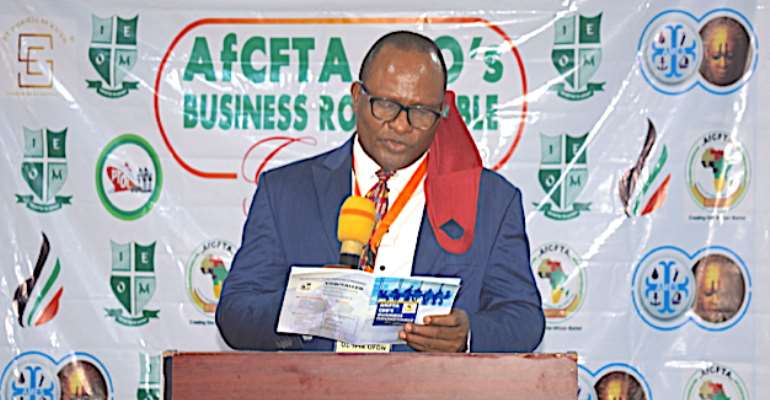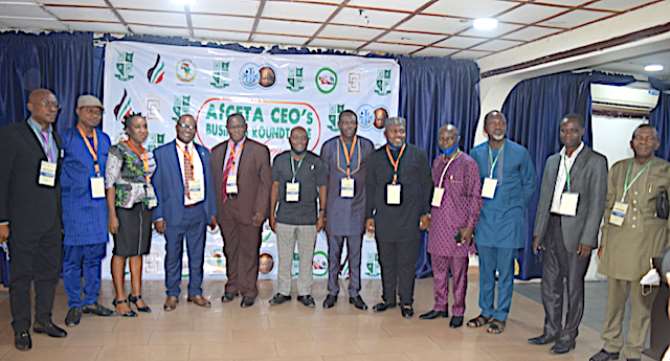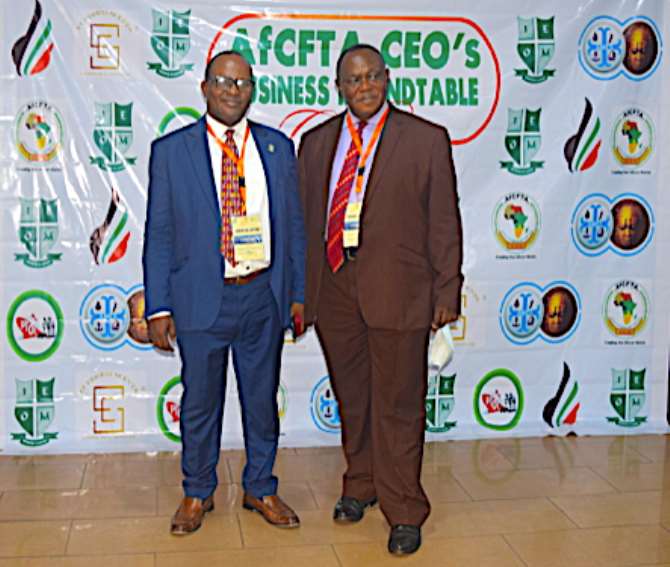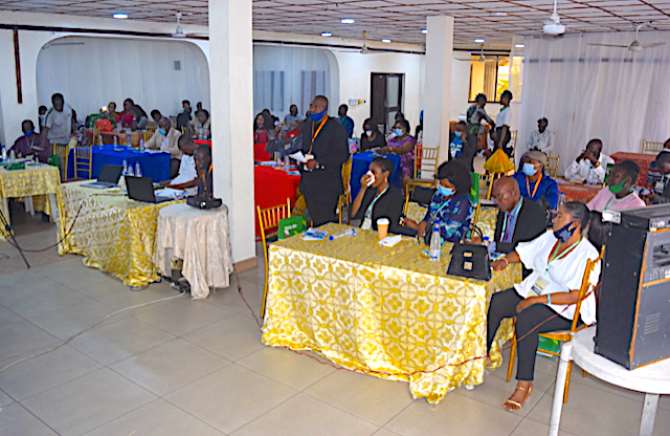IEOM Business Roundtable: Participants Call For AfCTA Domestication, Infrastructural Dev. & Positioning Of MSME To Reap AfCFTA Benefits

In an effort to engage business leaders and equip them with the knowledge and insights required to take advantage of the Africa Continental Free Trade Agreement (AfCFTA), the Institute of Export Operations and Management (IEOM) – an independent trade support institution established with the aim of boosting the drive toward a non-oil-based economy in Nigeria – hosted its first-ever business roundtable. The event witnessed the presence of CEOs and business leaders from over 50 companies, across various economic sectors, coming together to discuss the recently operational Africa Continental Free Trade Agreement and the underlying potentials and benefits inherent.
With the vision to cooperate and not compete, a market of 1.2 billion people, and a combined GDP of $3 trillion there has been a wide consensus that the African Continental Free Trade Area (AfCFTA) offers potentials and a huge opportunity to exploit the abundant wealth and resources of the African continent for the benefit of her people; hence the need to respond to the current challenges to the multilateral trading system by consolidating and advancing African continental market integration objectives, through the AfCFTA.
This was the consensus as the Institute of Export Operations and Management (IEOM) – an independent trade support institution established with the aim of boosting the drive toward a non-oil-based economy in Nigeria – hosted its first-ever AfCFTA CEO’s Business Roundtable with the Theme - "Repositioning Nigerian Businesses In The Afcfta Era: Business Strategies And Support Services".
5th From Left, Prof Jonathan Aremu, Member of the National Action Committee on AfCTA and other resource persons and participants at the event.
The event held at the prestigious L.A Kings Hotel and Conference centre in Port Harcourt was well-attended physically, and featured participants joining via video link. It further illuminated AfCFTA promises of a virtuous circle of greater market opportunities, that will trigger more trade and investment, and allow greater value addition and productivity growth, it also exposed inherent values that will lead to more and better jobs with social inclusion, and thus further enlarged markets.
Making his opening remark, the Executive Secretary of IEOM, Mr. Ofon Udofia said the roundtable event is coming at a critical time especially now that the Free Trade Agreement has become effective since January 1st, 2021. He noted that AfCFTA is a massive indication that Africa is open for business and mutually beneficial investment that will translate to creating decent jobs and improving livelihoods. He however stressed that a lot needs to be done across the country to truly engage business leaders and equip them with the knowledge and insights to take advantage of what AfCFTA has to offer. According to the IEOM helmsman, for businesses to fully benefit from AfCFTA it is imperative that we take definite steps to position our businesses strategically.
Hear him:” it is within this context that the AfCFTA Business roundtable was conceived by the institute with the key aim of equipping business leaders with the insight and clarity needed to make some smart decisions regarding your participation in international trade under the AfCFTA umbrella” he was quoted as saying.
The guest speaker, Professor of International Relations and economics at the Covenant University, Ota, and member of the National Action Committee on AfCFTA in Nigeria, Prof Jonathan Aremu had commended the Institute of Export Operations and Management (IEOM) for organizing such an invaluable Business roundtable, noting that the sensitization was in line with the mandate to prepare Nigeria to take advantage of the AfCFTA Agreement while also mitigating its threats to the Nigerian economy.
He said Nigeria signed the AfCFTA treaty on the 7th of July, 2019, and ratified the Treaty on the 4th of December 2020. According to him, African states who ratify and implement the agreement would have to make domestic adjustments in their national laws to comply with obligations imposed by AfCFTA , thereby making the Treaty part of their national laws through domestication.
He, however, frowned at the records of African countries who are sluggish on domesticating regional trade agreements especially the AfCFTA, saying this development has contributed to a serious ‘implementation gap’ in many countries within.
Hear him: “If AfCFTA provisions are not domesticated into national law they cannot be employed in defense of cases involving their violations before courts of law in the country neither can they be used for the advocacy of rights within the country, further to this, violators of AfCFTA provisions, be they state institutions, companies or individuals cannot be held accountable, since the AfCFTA Treaty has not been domesticated in the country,” he said, adding that failure of Nigeria to domesticate AfCFTA, or lateness in doing so causes unreasonable hardship on the other AU Member States that intends having a commercial relationship with the country under the continental economic integration.
He named some of the gains of the AfCFTA as; Better Infrastructure and Improved Digital Connectivity, Freer Movement of People and Good Business Environment, Facilitation of Small and Medium Scale Trade. According to him, the core objective of the AfCFTA is to create a single market for goods, services, and free movement of persons in order to deepen the economic integration of the African continent,” he said.
Speaking about COVID-19 in the Implementation of AfCFTA, said African countries cannot afford to wait until the virus is totally contained because clearly, liberalization of economic activities, as well as the movement of people, are the cornerstone of the African Union's (AU) Agenda 2063. Hence the need for us to interact but more cautiously.; He continued by adding that COVID-19 is a kind of blessing in disguise for Africa integration; given that the AfCFTA could significantly mitigate the COVID-19 economic consequences, leaders should speed up its implementation, rather than delay it, he opined.
Concluding, the renowned Professor noted that In repositioning the country for AfCFTA, in this era and beyond COVID-19, the Nigerian policymakers should not consider only the technical aspects of compliance in the AfCFTA implementation, but also the opportunities it opens for substantial domestic reforms dynamics, in the areas of trade, investment, private sector engagement and sustainable productive capacity, which would benefit from domestic political and economic support.
Mr Ofon Udofia and Prof Jonatham Aremu
He noted that while AfCFTA could increase the welfare of Nigerians (corporate and individuals) significantly when NTBs are substantially reduced; its implementation could also result in costs, including potentially higher income inequality and transitional unemployment.
Hence he said to reap the benefits of the AfCFTA as well as mitigate its related costs, Nigeria needs to pursue a concomitant ambitious, and broad-based reform agenda. He advocated that Nigeria must tap the potential benefits of the AfCFTA, by reducing the infrastructure deficit notably inroads and ports, among others) by building on ongoing efforts; and reducing other critical NTBs, such as customs and administrative requirements, that directly affect the capacity of economies to move traded merchandise within and outside their borders. Reduce Nigeria’s large infrastructure deficit in roads and ports to increase the competitiveness of the country vis a vis other countries, Improve trade facilitation commitment of the country as regards Categories A, B, and C with WTO/TFA as a priority area for reform and ensure strong institutional and governance framework in the implementation of AfCFTA.
Similarly, to mitigate possible adverse effects of AfCFTA, Nigeria should, he said the country must promote inclusive growth policies that ensure key transmission channels of the effects of AfCFTA to the population function efficiently via four mutually reinforcing initiatives like the functioning of product markets; flexible labor market; social protection programs; encouragement investment and innovation within a well-defined national transformation strategy. He advocated we put in place a more flexible labor market to help mitigate the potential adverse employment effects of trade liberalization under the AfCFTA, Ensure more efficient product markets that could help transmit broader benefits of trade liberalization to the Nigerian population among others.
The high-quality event which had in attendance virtual participants also witnessed a virtual presentation by the keynote speaker and a renowned economist in international trade and regional integration. Mr. Theodore Kofi Markham from Ghana. He remarked elaborately on the AfCFTA Ghanaian experience and success story, the impact, and strategies put in place by Ghana to achieve the AfCFTA objective and offered a bit of a roadmap for Nigeria to fastrack the process.
For Ghana, he said AfCFTA is an ongoing success story as mechanisms have been put in place to ensure success and strict adherence. According to him, Ghana did not just host the secretariat of AfCFTA, they launched a diplomatic initiative by taking specific actions to harness the benefits. The Ghanaian government took a huge alignment and completed key policies in trade and support services programmes, and reviewed national development strategies. Ghana according to him has started removing import duties in African-bound goods to facilitate inter-country and greater volume trade.
Theodore Kofi Markham who had worked at the United Nations International Trade Center in Geneva for 21 years, with responsibility for technical assistance in trade promotion said as a member of the Ghana AfCFTA team, business communities, the organized private sector, and chambers of commerce are constantly sensitized to understand the dynamics of AfCFTA.
Similarly, he said in Ghana, Covid 19 palliatives are focused on areas that can enhance competitiveness, even as the country has adopted far-reaching industrialization policies, with strategic export policy reform that will build synergies to ensure that products are competitive.
Churning out advice to the Nigerian state, Theodore Kofi Markham described Nigeria as one of the biggest countries in Africa with huge economic capacity emphasized the need to domesticate the AfCFTA laws in Nigeria to make its operations seamless. He advised that the country must embrace and endorse industrialization, improve electricity and railway infrastructures to lower the cost of production; stressing that the government must take measures to enhance the competitiveness of the private sector, promote competitive interest rate, build feeder roads to link local communities to connect agriculture areas and help reduce production cost with a dedicated improvement of security
Mr. Francis Anatogu, Secretary of the National Action Committee on the AfCFTA in Nigeria was also live via the zoom virtual meeting where he noted that all that should be said has been clarified by the erudite Professor Jonathan Aremu. He, however, responded to questions by participants, using the occasion to explain the dynamics of the AfCFTA agreement, and what it implies for Nigeria and Nigerian business. He said the AfCFTA process is high on the agendas of African policy-makers, and for the international partners who support it and the related continental and regional processes, hence business roundtables of this nature are quite strategic and imperative as the stakeholders constitute an integral part of the AfCFTA drive that would ensure a smooth, seamless, and beneficial implementation of the agreement. He described the AfCFTA as a vehicle for Nigeria’s quest for economic diversification, Anatogu said: “For as long as we depend on crude oil revenue, our economic prosperity will depend on oil prices which sadly continued to fall in recent time.
Cross section of participants
The solution according to him is to expand non-oil exports and provide all members preferential access to the African market which AfCFTA gives us the opportunity to do.
He said the idea is to remove tariff up to 90% on goods from Africa to Africa under AfCTA.
Speaking on Nigeria’s preparedness for the AfCFTA Mr. Anatogu said, “We understand how to deal with preferential trade, and are in a better position than a number of African countries. He said “We are going into Africa without paying duties; it will give us an advantage over products that come from outside of Africa. in other words, we need to play to our strengths, with the presence of banks, movies, and lots of informal services trade with Africa, we must move to amplify this trade, and several productions and a sustainable way to do it is through exports because to maintain the value of wealth, you need exposure to foreign trade. ‘So value addition is critical, diversification, building resilience in our economy, and Nigeria need to produce quality to be competitive” he said, adding that AfCFTA is a training ground to start mastering the dynamics of global trade.
Later on, Dr. Sylvester Udeorah, a lecturer with the department of economics in the University Of Port Harcourt while speaking to newsmen said Africa’s prosperity depends largely on intra-African trade. He noted that an increase in trade is the surest way to deepen regional integration in Africa; stressing that Africa is now the world’s largest free trade area since the formation of the World Trade Organization, and opined that we must make it count.
It will be recalled that on Wednesday, 21 March 2018, in Kigali, Rwanda, 44 African countries endorsed the African Continental Free Trade Area (AfCFTA), and 9 other African Union member countries, including Nigeria and South Africa, delayed assent to the treaty. While member states were busy signing the treaty, there were calls from different quarters in Nigeria as to whether the country should sign or not sign the AfCFTA, particularly members of the Organized Private Sector (OPS), which claimed that they were not adequately consulted during the negotiating period but all that is history now with the AfCFTA treaty signed on the 7th of July, 2019 and subsequently ratified on the 4th of December 2020.
With Nigeria finally adding its name to the list of countries to have ratified the Africa Continental Free Trade agreement, gluts are saying it is a significant step on its own and the right step to take, considering Nigeria's foremost leadership role in the process that resulted in the creation of the AfCFTA.With the launch of trading under the FTA regime, it is clear that the real work has now just begun.
The promise of the AfCFTA is ultimately to drive economic growth in Africa and economic integration between African nations through increased Intra-Africa trade. In joining the list of ratifying countries, Nigeria has signified its intention to remain a key player and beneficiary of the AfCFTA.
The highly successful event also had in attendance, Nigeria Customs Services, Nigerian Immigration Services, Nigeria Shippers Council, NAFDAC, NEPC, NPA among others; it also witnessed presentations from sponsors of the event including Ames-Edo Inland Container Dry Port, Ace-emerald Consulting Limited a one-stop outsourcing business solution for the trade industry, Zenith Bank Plc, Port and Terminal Operators Nigeria Limited, and Euphoria Scents.



